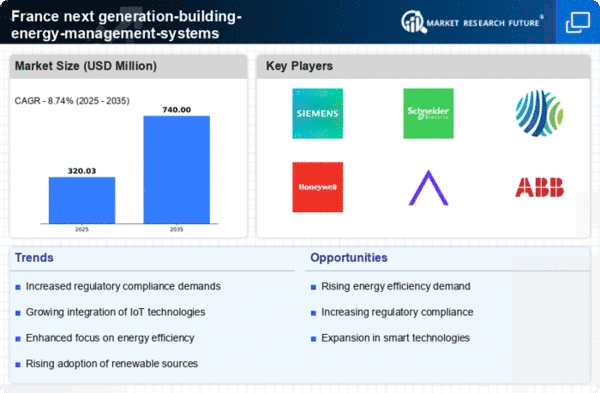Rising Energy Costs
The escalating energy costs in France are driving the next generation-building-energy-management-systems market. As energy prices continue to rise, businesses and homeowners are increasingly seeking solutions to optimize energy consumption. This trend is evident in the growing demand for advanced energy management systems that can provide real-time data and analytics. According to recent reports, energy costs in France have surged by approximately 15% over the past two years, prompting a shift towards more efficient energy practices. The next generation-building-energy-management-systems market is positioned to benefit from this trend, as these systems offer tools for monitoring and controlling energy use, ultimately leading to cost savings and enhanced sustainability.
Technological Advancements
The rapid pace of technological advancements is significantly influencing the next generation-building-energy-management-systems market. Innovations in IoT, AI, and machine learning are enabling more sophisticated energy management solutions. These technologies allow for predictive analytics, automated controls, and enhanced user interfaces, making energy management more accessible and efficient. In France, the adoption of smart meters and connected devices has increased, with estimates suggesting that over 30% of households are now equipped with smart energy solutions. This trend indicates a growing acceptance of technology in energy management, which is likely to propel the next generation-building-energy-management-systems market forward as consumers and businesses seek to leverage these advancements for improved energy efficiency.
Government Sustainability Goals
France's commitment to sustainability and reducing carbon emissions is a significant driver for the next generation-building-energy-management-systems market. The French government has set ambitious targets to reduce greenhouse gas emissions by 40% by 2030 compared to 1990 levels. This regulatory framework encourages the adoption of energy-efficient technologies and practices. The next generation-building-energy-management-systems market is likely to see increased investment as organizations align their operations with these sustainability goals. Furthermore, the integration of renewable energy sources into building management systems is becoming essential, as it supports the transition towards a low-carbon economy. This alignment with national objectives is expected to foster innovation and growth within the market.
Integration of Renewable Energy Sources
The integration of renewable energy sources into building energy management is becoming increasingly vital in France, thus driving the next generation-building-energy-management-systems market. With the French government promoting the use of solar, wind, and other renewable energies, buildings are increasingly being designed to accommodate these technologies. This shift is supported by incentives for renewable energy installations, which have seen a rise of over 25% in recent years. The next generation-building-energy-management-systems market is likely to benefit from this trend, as these systems facilitate the efficient management of energy generated from renewable sources, ensuring that buildings can optimize their energy use while contributing to national sustainability goals.
Increased Awareness of Energy Efficiency
There is a growing awareness of energy efficiency among consumers and businesses in France, which is driving the next generation-building-energy-management-systems market. As individuals become more conscious of their energy consumption and its environmental impact, the demand for energy management solutions is rising. Educational campaigns and initiatives by the government and non-profit organizations have contributed to this heightened awareness. Reports indicate that approximately 70% of French consumers are now actively seeking ways to reduce their energy usage. This shift in consumer behavior is likely to encourage the adoption of next generation-building-energy-management-systems, as these systems provide the necessary tools to monitor, analyze, and optimize energy consumption effectively.
















